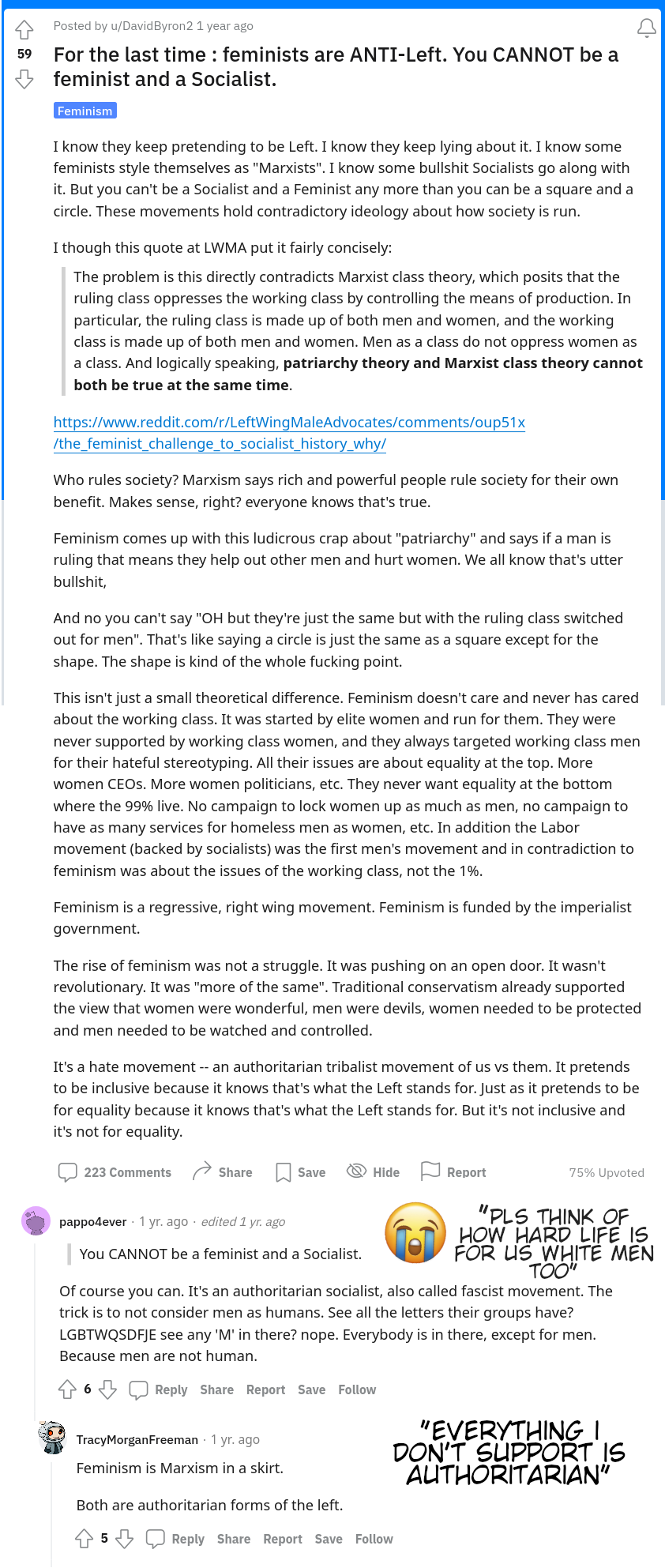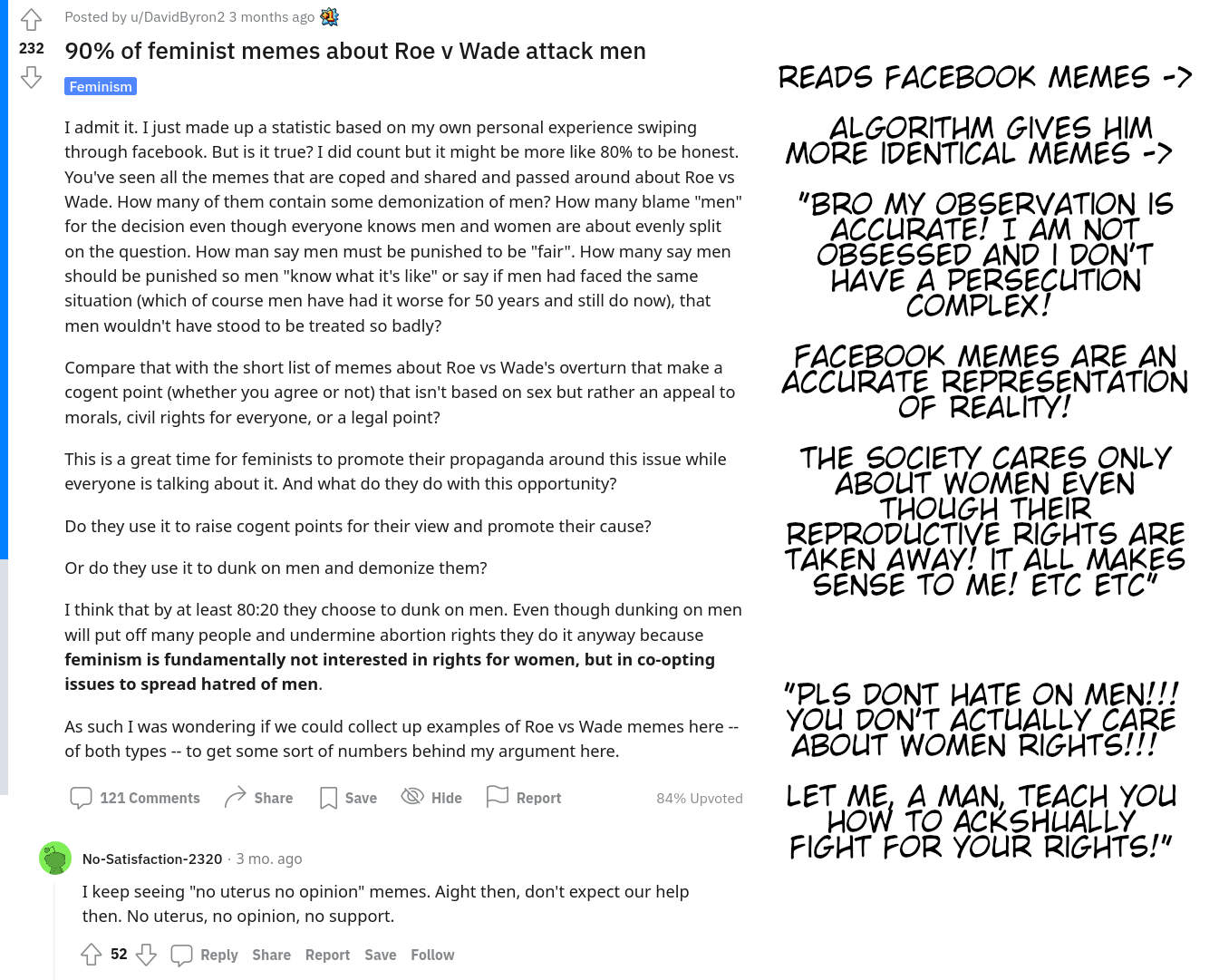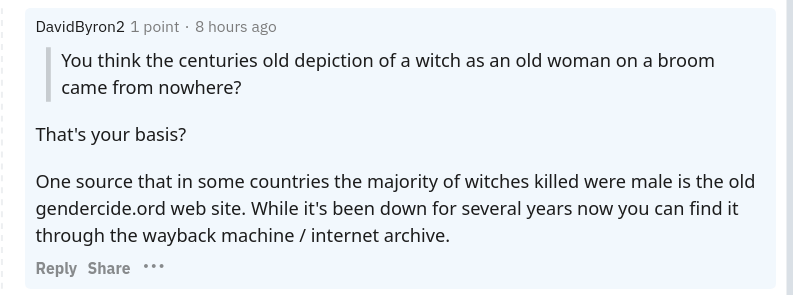Ended up on a rather unpleasant sub on accident, dunno where to post it lol. Not really fit to discuss these issues, but somehow I hear similar takes from leftists in my country from time to time, bruh.
full post screenshot + link

https://www.reddit.com/r/MensRights/comments/ouq7es/for_the_last_time_feminists_are_antileft_you/ - post link
https://lemmygrad.ml/pictrs/image/ad7be930-e318-4c4e-98e1-b8f6397c147e.png - image link if it doesn’t load
very "sane and lucid" roe v wade take

https://lemmygrad.ml/pictrs/image/429ec0ac-dffc-4494-852b-2f75c68af535.png - image link

btw the person who posted these seems to be a genshin fan


Angela Davis and Leslie Feinberg <3
Indigenous feminist Jihan Gearon also talks about the specific way that patriarchy and cisnormativity was forced on Diné people through boarding schools and sexual violence:
"Patriarchy gives men power and privilege at the expense of women and acts as the framework for the domination and oppression of gay, queer, and transgender people, as well as the stunted development of men. In Indigenous communities, it also erases and twists Indigenous teachings and worldviews on gender and sexuality, namely the diversity and power of these aspects and experiences. After all, Diné people traditionally have four genders based on the role a person plays in the larger community. The roles of naadheeh (feminine man) and dilbaa’ (masculine woman) have a unique ability and responsibility to act as translators between asdzáá (feminine woman) and hastiin(masculine male), and they have a unique ability to bring about balance between the masculine and feminine.
However, patriarchy isn’t just entwined with the systems of colonization, white supremacy, and capitalism. Colonization, white supremacy, and capitalism need patriarchy to work.
Women’s work is the original subsidy for capitalism. Reproductive labor is necessary for social reproduction [everything it takes for a labor force to replicate itself]: purchasing household goods, preparing and serving food, laundering and repairing clothing, maintaining furnishings and appliances, socializing children, providing care and emotional support for adults, and maintaining kin and community ties. It involves manual, mental, and emotional labor. As more and more people have come to realize during the COVID-19 pandemic, every human being needs this kind of essential work to live. Yet, reproductive work rarely even counts as work at all. Patriarchy teaches that it’s the “natural” role of women, and so, where it is paid at all, it is underpaid.
This kind of capitalism and patriarchy goes hand in hand with colonialism. In Dinétah—my homelands now reduced to the Navajo Nation—we still practiced our traditional customs while we resisted the Spanish and were warring with the US, including our traditional matriarchal society that gave matriarchs the final say over land and resources. But when the US government force-marched ~9,000 of us to the Bosque Redondo internment camp in New Mexico, where we remained from 1864 to 1868, a time known as Hweeldi or the Long Walk, women were subject to new atrocities, commonplace rape, and forced into prostitution to survive.
This was the beginning both of institutional sexual violence against our women and of a transformation of how women were viewed by our own people.
The story continued when we signed our treaty in 1868 and returned home to a much smaller homeland. In signing the treaty, we also agreed to have our children educated in the US system. This meant sending them to boarding schools and forcing them to assimilate into western ways of thinking and operating. In addition to learning white supremacy, these schools taught our people the gender binary and the roles associated with it: that women are less than men, that queer people are unnatural, etc.
When oil was discovered on Navajo Nation, a Navajo Nation Business Council was established in 1922, to sign leases and meet the demands of the oil companies. The Secretary of the Interior at the time, a friend to the oil industry, knew he could not open the Navajo Nation to oil development if he approached a diverse and distributed clanship system. So he created a “business council” and selected three Navajo men to serve on it. These men were likely born during hweeldi, and the first to be assimilated in boarding school.
Women still had their livestock, of course, which allowed them economic autonomy and success: In the 1870s, we had 15,000 sheep; in the 1920s, we had 500,000; and by 1931, we had 2 million. But the colonizer doesn’t want us to be successful, so the federal government conjured up a policy called The Navajo Livestock Reduction, purchasing, removing, and slaughtering our livestock (and arresting those who opposed it). They also set up a grazing system, which ensured we would not be able to grow our herds again and that system is still used today. While this killed the economic autonomy of the Navajo people, it particularly impacted the women because they owned those herds. Men were away working as laborers, while women and their families still relied heavily on the sheep economy to survive. Killing these herds ensured that Navajo women too would have to depend on the wage labor, decisions, and direction of Navajo men."
I find it astounding that there is a subset of Marxists who can argue the importance of decolonization, the evils of Imperialism, and the sexual violence and predation experienced by women primarily (through sex work and the porn industry as well, which is nearly-universally accepted as sexual violence by Marxists), but then argue that race and gender are not classes.
Class: the system of ordering a society in which people are divided into sets based on perceived social or economic status.
Even a look at a very basic definition should be enough to realize there are more ways to stratify people than just their relation to means of production. Class-based societies have existed since long before capitalism comrades, and if we do nothing to address the issues that capitalism has created by assigning race and gender classes, it will continue to exist long after capitalism has been destroyed. Communism’s goal is a classless society, but it seems there are certain Marxists who are content to remain in a classist society as long as their class is on top.